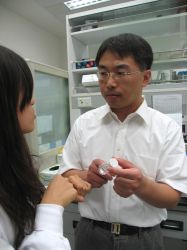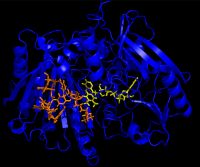|
The glycopeptide antibiotics vancomycin and teicoplanin are currently the last resort for treating serious gram-positive infections. Many microbiologists believe that the appearance of vancomycin-resistant pathogen infections is only a matter of time.
Approaches through techniques such as DNA recombinant manipulation and metabolic pathway engineering are the latest progresses toward the new drug development. The methods show promising potentials and have been pursued by well known research institutes and big pharmas.
One of the Functional Genomics Research teams in Genomics Research Center at Academia Sinica singled out Antibiotics A40926, teicoplanin and chloroeremomycin as their studying targets. Their approach is to manipulate the biosynthetic gene cluster of the selected glycopeptide antibiotics to modify existing antibiotics to newer and better variations.
For that matter, they have spent two years to-date to study the biological function of each gene involved in the biosynthesis needs. They first achievement was the discovery of three unfamiliar homologous enzymes during the biosynthesis process of A40926, teicoplanin, and chloroeremomycin.
|
Their finding identified two proteins as novel deacetylases and the third a thymidyltransferase. These enzymes work hand in hand as in a relay in forming the antibiotics in such a way that the deacetylases catalyze the deacetylation reaction of N-acetylglucosaminyl-teicoplanin pseudoaglycone, making it a decisive step for a subsequent acylation to occur.
That result was a major milestone in solving the long-sought mystery of the stated biosynthetic pathways for three clinically important glycopeptide antibiotics and was published a year ago.
Lately, the same team has further discovered a key enzyme that is involved in the N-acyl aminoglucuronic acid biosynthesis. Through a series of site-directed mutagenesis studies and liquid chromatography combined mass spectrometry analyses, they have identified this new but major key enzyme as the last one in the recipe in biosynthesis of the potent drug lead.
In addition, they also found out this new enzyme can bio-transform the clinically used glycopeptides antibiotics “teicoplanin” into a novel glycopeptides, meaning it is a very promising enzyme to be used to enhance the efficacy of glycopeptide drugs on the market today.
“The results should accelerate the development of more potent drugs. Besides showing promises to creating newer antibiotics that are desperately in need, it also instills fresh elements into the biotech industry”, claimed Dr. Tsung-Lin Li, the primary investigator of this study.
Their latest finding has been once again noticed by the flagship journal JACS of American Chemical Society and will be published soon.


